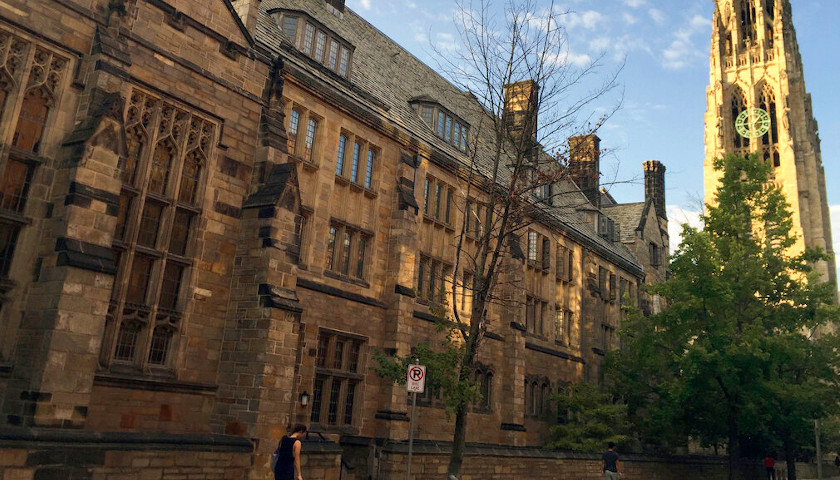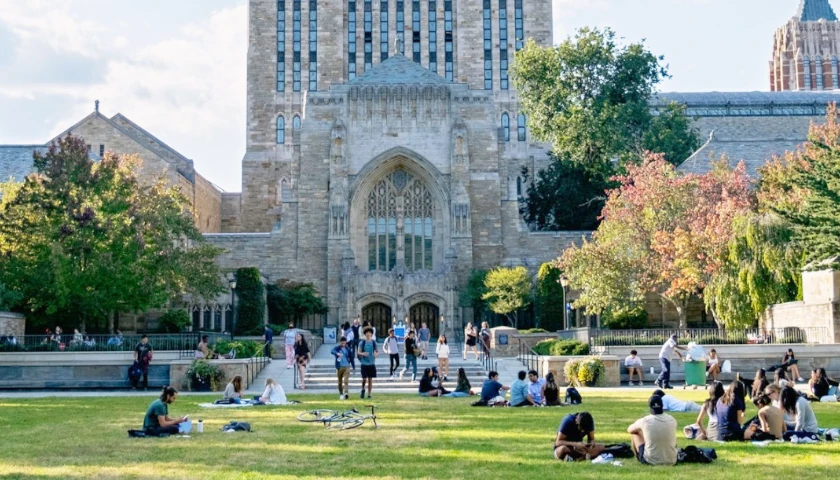by Michael Balsamo
WASHINGTON, D.C. (AP) — A Justice Department investigation has found Yale University is illegally discriminating against Asian American and white applicants, in violation of federal civil rights law, officials said Thursday.
Yale denied the allegation, calling it “meritless” and “hasty.”
The findings detailed in a letter to the college’s attorneys Thursday mark the latest action by the Trump administration aimed at rooting out discrimination in the college application process, following complaints from students about the application process at some Ivy League colleges. The Justice Department had previously filed court papers siding with Asian American groups who had levied similar allegations against Harvard University.
The two-year investigation concluded that Yale “rejects scores of Asian American and white applicants each year based on their race, whom it otherwise would admit,” the Justice Department said. The investigation stemmed from a 2016 complaint against Yale, Brown and Dartmouth.
“Yale’s race discrimination imposes undue and unlawful penalties on racially-disfavored applicants, including in particular Asian American and White applicants,” Assistant Attorney General Eric Dreiband, who heads the department’s civil rights division, wrote in a letter to the college’s attorneys.
Prosecutors found that Yale has been discriminating against applicants to its undergraduate program based on their race and national origin and “that race is the determinative factor in hundreds of admissions decisions each year.” The investigation concluded that Asian American and white students have “only one-tenth to one-fourth of the likelihood of admission as African American applicants with comparable academic credentials,” the Justice Department said.
“Unlawfully dividing Americans into racial and ethnic blocs fosters stereotypes, bitterness, and division,” Dreiband said in a statement. “It is past time for American institutions to recognize that all people should be treated with decency and respect and without unlawful regard to the color of their skin.”
The investigation also found that Yale uses race as a factor in multiple steps of the admissions process and that Yale “racially balances its classes.”
The Supreme Court has ruled colleges and universities may consider race in admissions decisions but has said that must be done in a narrowly tailored way to promote diversity and should be limited in time. Schools also bear the burden of showing why their consideration of race is appropriate.
In a statement, Yale said it “categorically denies this allegation,” has cooperated fully with the investigation and has been continually turning over “a substantial amount of information and data.”
“Given our commitment to complying with federal law, we are dismayed that the DOJ has made its determination before allowing Yale to provide all the information the Department has requested thus far,” the university said in a statement. “Had the Department fully received and fairly weighed this information, it would have concluded that Yale’s practices absolutely comply with decades of Supreme Court precedent.”
The university said it considers a multitude of factors and looks at “the whole person when selecting whom to admit among the many thousands of highly qualified applicants.”
“We are proud of Yale’s admissions practices, and we will not change them on the basis of such a meritless, hasty accusation,” the statement said.
The Justice Department has demanded that Yale immediately stop and agree not to use race or national origin for upcoming admissions. The government also says that if Yale proposes that it will continue to use race or national origin as a factor in future admission cycles, the college must first submit a plan to the Justice Department “demonstrating its proposal is narrowly tailored as required by law, including by identifying a date for the end of race discrimination.”
The Justice Department has also previously raised similar concerns about Harvard University, which prosecutors accused of “engaging in outright racial balancing,” siding with Asian American students in a lawsuit who allege the Ivy League school discriminated against them.
A federal judge in 2019 cleared Harvard of discriminating against Asian American applicants in a ruling that was seen as a major victory for supporters of affirmative action in college admissions across the U.S. That ruling has been appealed and arguments are scheduled for next month.
In the Harvard case, the Justice Department had argued that the university went too far in its use of race, but the judge disagreed. Though the Supreme Court has ruled that colleges’ use of race in admissions must be “narrowly tailored” and can be only a “plus factor,” past rulings still give colleges wide latitude in considering a wide range of factors, including race, as they build their classes.
– – –
Michael Balsamo is a reporter for The Associated Press. AP writer Collin Binkley in Boston contributed to this report.
About the Headline Photo: This Sept. 9, 2016 photo shows Harkness Tower on the campus of Yale University in New Haven, Conn. A Justice Department investigation has found Yale University is illegally discriminating against Asian-American and white applications, in violation of federal civil rights law, officials said Thursday, Aug. 13, 2020. (AP Photo/Beth J. Harpaz, File)






The original intent (or at least the stated intent) of “Affirmative Action” was that colleges as well as corporations would “affirmatively” seek out QUALIFIED candidates from “protected” groups who might not otherwise apply for enrollment or employment. Any such candidates would then be expected to compete with other candidates on a level playing field, with no preferences for one group or another in the actual selection process. I was involved in implementing this program for my employer in the early 1970s. I thought then — and still do — that this program, in its original form, was a fair and effective way of addressing the de facto discrimination that had occurred in the past, and, to some degree, was still occurring.
Unfortunately, it didn’t take long for the original program to be corrupted by members of some protected groups who weren’t at all interested in competing on a level playing field, but instead demanded –and got, with the help of some corrupt politicians and judges (I know, that’s redundant) — special preferences, which soon became quotas, and, from that point on, it’s been all downhill.,
I was young and naive enough to think that a program such as the original Affirmative Action could actually be allowed to continue without being corrupted. I’m older and wiser (or maybe just more cynical) now, and I realize that any time the government tries to help one group, it will always be at the expense of some other group and will inevitably be corrupted. The only unknown is how long it will take.
It’s long past time to discontinue all Affirmative Action programs, and get back to selecting candidates strictly on merit.
The whole idea of race or socioeconomic status being used to justify admitting underperformers to college is flat out wrong. But of course “higher” education is no longer about education.